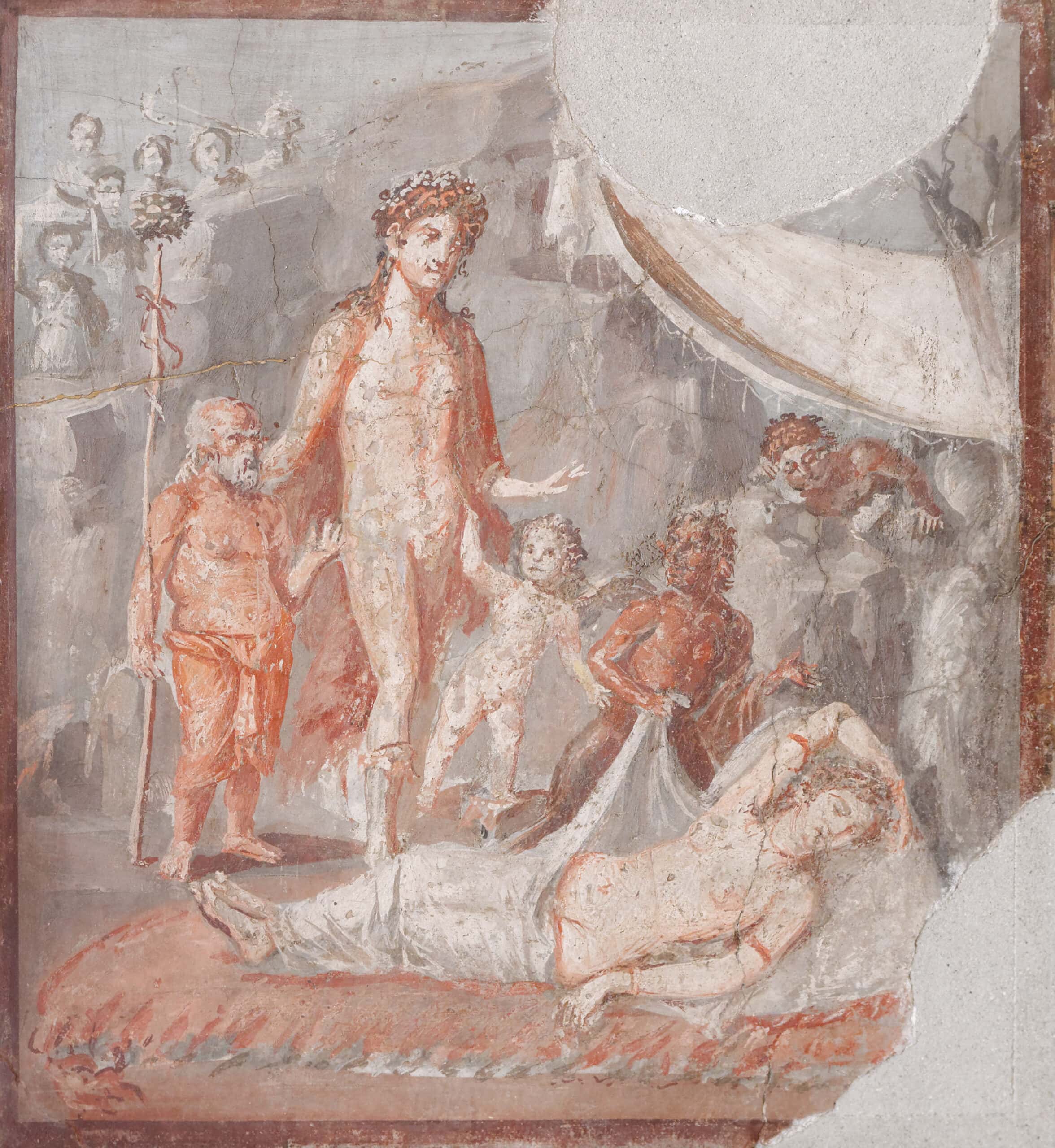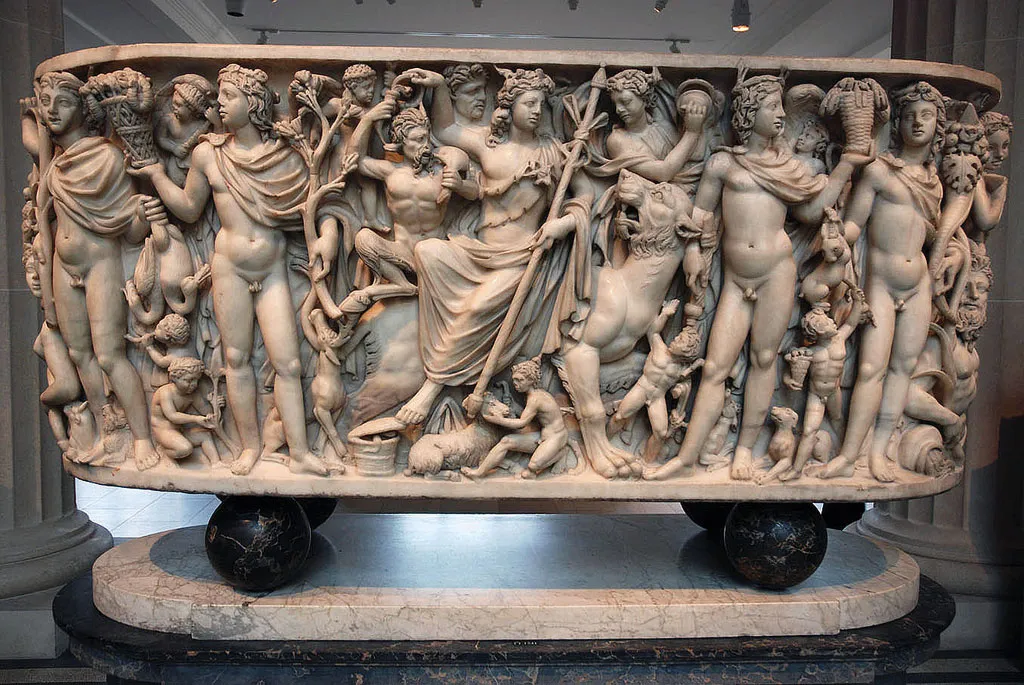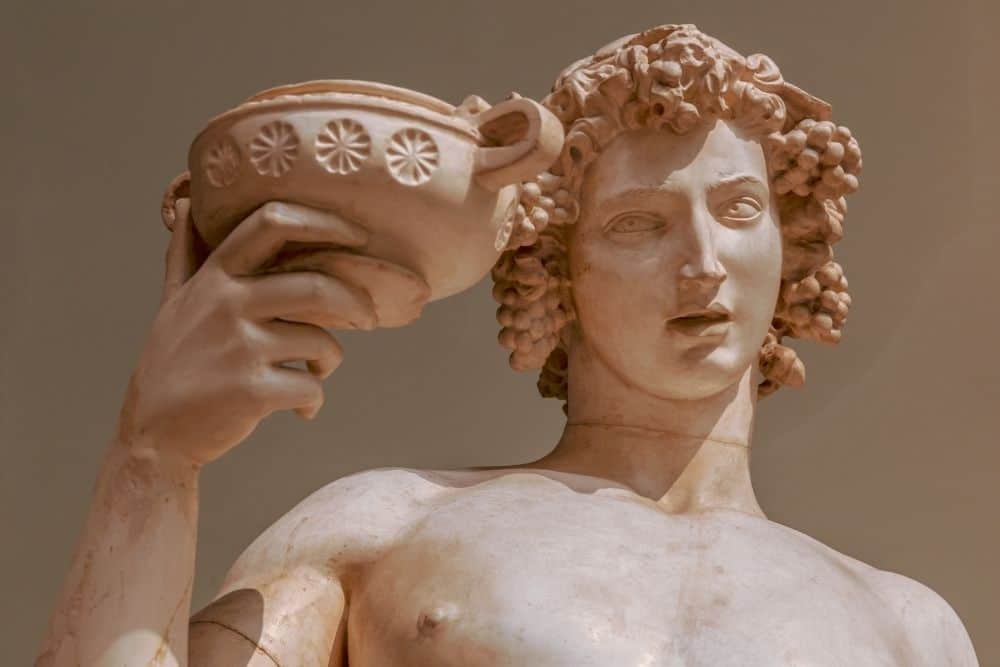Dionysos is one of the most fascinating gods of ancient Greek mythology. He was the god of wine, fertility, and theater, often associated with wild and ecstatic rituals. Dionysos, known as Bacchus in Roman mythology, was one of the twelve Olympian gods.
Dionysos was the son of Zeus and Semele, a mortal woman. His birth was unusual, as his mother was burned to ashes by the sight of Zeus in his proper form. However, Zeus saved his son by sewing him into his thigh until he was ready to be born. Nymphs raised Dionysos, and became known for his love of wine and celebration.
Dionysos was a complex figure representing both the joy and the danger of excess. His followers often engaged in wild and frenzied rituals, including dancing, drinking, and tearing animals apart with bare hands. However, Dionysus was also a god of theater and was associated with catharsis, or the release of emotions through art. Dionysos remains a fascinating and enigmatic figure in Greek mythology, and his influence can still be felt in modern culture.
Birth Story
Dionysos, the Greek god of wine, fertility, and ecstasy, had a unique birth story. According to Greek mythology, he was the son of Zeus, the king of the gods, and Semele, a mortal woman.
Zeus fell in love with Semele and promised to grant her any wish. She asked him to reveal himself properly, and Zeus, unable to refuse her, appeared before her in all his glory. However, the sight was too much for Semele, and his lightning bolts consumed her.
Zeus saved the unborn child by sewing him into his thigh until he was ready to be born. Dionysos was born from Zeus’s thigh, fully grown and powerful when the time came.
The birth of Dionysos was a joyous occasion celebrated with music, dance, and wine. He was welcomed into the world as a god of fertility and ecstasy, bringing joy and pleasure to those who worshipped him.
In Greek mythology, the birth of Dionysos is often depicted as a symbol of the power of nature and the joy of life. His birth story is a reminder that even amid tragedy and darkness, there is always the possibility of new life and joy.
Family and Sibling
Dionysos is the son of Zeus and Semele, a mortal princess. His family tree is quite complex, with many versions of his genealogy appearing in different myths. According to some sources, Dionysos had several siblings, including the goddesses Persephone, Aphrodite, and Artemis, as well as the god Hermes. However, there is no consensus on his siblings, and some myths depict Dionysos as an only child.
In some stories, Dionysos is said to have been born twice. The first time was when his mother, Semele, was burned to death by Zeus’s lightning bolt while she was pregnant with him. Zeus rescued the unborn Dionysos from her womb and sewed him into his thigh until he was ready to be born again. This second birth made Dionysos a god and gave him immortality.

Dionysos’s family plays a vital role in many of his myths. For example, in one story, his cousin Pentheus, king of Thebes, refuses to believe in Dionysos’s divinity and tries to ban his worship. Dionysos responds by driving Pentheus mad and causing him to be torn apart by his mother and aunts, who are caught up in a frenzy of Bacchic worship.
In another myth, Dionysos travels to the underworld to rescue his mother, Semele, from the realm of the dead. With the help of his half-brother Hermes, he can bring her back to life and restore her to her rightful place in the world of the living.
Dionysos’s family and siblings are an essential part of his mythology, shaping his character and driving many of his actions. While there is some variation in the details of his genealogy, his relationships with his family members are consistent throughout his stories.
Marriage
Dionysos was known for his many romantic affairs and marriages throughout Greek mythology. One of his most famous marriages was with Ariadne, the daughter of King Minos of Crete. According to mythology, Ariadne was abandoned by Theseus on the island of Naxos, where Dionysos found her and fell in love with her. The two were married in a sacred ceremony that was said to have united the god and his bride in a spiritual and physical union.
Dionysos was also known for his relationship with Ampelos, a mortal youth who was turned into a grapevine after his death. The god was said to have been devastated by losing his lover and immortalized him in the form of the vine. The story of Ampelos is often seen as a metaphor for the cycle of life and death, as well as the transformative power of love.
In addition to these romantic relationships, Dionysos was also associated with the institution of marriage itself. In some myths, he was said to have been married to the goddess of love, Aphrodite, and the two were often depicted together in art and literature. Dionysos was also associated with fertility and the life cycle, making him a popular figure in marriage ceremonies and rituals.
Overall, Dionysos’ marriages and relationships were an essential aspect of his mythology and helped to shape his identity as a god of love, fertility, and transformation.
Boyfriend
Dionysos was known for his many romantic relationships with both men and women. He was often depicted as a lover of wine, music, and pleasure, and his followers would often engage in wild parties and orgies in his honor.
One of Dionysos’ most famous lovers was Ampelos, a handsome satyr transformed into a vine by the god after his tragic death. Dionysos was said to have been deeply in love with Ampelos, and his grief over his death was said to have inspired him to create the first grapevine.
Another of Dionysos’ lovers was Ariadne, the daughter of King Minos of Crete. Dionysos rescued Ariadne from her abandoned state on the island of Naxos and made her his wife. Together they had several children, including Thoas, Oenopion, and Staphylus.
Dionysos was also said to have had a romantic relationship with the mortal woman Semele, the mother of his son, the god Zagreus. Semele was tragically killed when she asked to see Dionysos in his proper form, which was considered too powerful for a mortal to bear.
Overall, Dionysos was known for his passionate and often tumultuous relationships, often associated with his cult’s wild and unpredictable nature.
Affairs and Children
Dionysos, the god of wine and fertility, was known for his many love affairs and children. He was a passionate god who often indulged in his desires and pleasures without restraint.
One of Dionysos’ most famous affairs was with the mortal woman Semele. The god fell deeply in love with her and promised to grant her any wish. Semele asked to see Dionysos in his proper form, which was too much for her mortal eyes to handle, and she perished. However, Dionysos saved their unborn child, the god Zagreus, and sewed him into his thigh until he was ready to be born.

Dionysos also had affairs with goddesses such as Aphrodite and Demeter and mortal women like Ariadne and Althaia. These affairs often resulted in the birth of many children. One of his most famous sons was the hero Herakles, born to the mortal woman Alcmene. Another son was the god Priapus, who was born to Aphrodite.
Dionysos was also the father of the god Iakkhos, born to the goddess Demeter. Iakkhos was the god of the Eleusinian Mysteries, a religious cult that worshipped Demeter and Persephone. Dionysos was often associated with this cult, and his son Iakkhos was seen as a guide for initiates.
Dionysos’ affairs and children were a significant part of his mythology. They represented his passion, fertility, and connections to mortal and divine worlds.
Powers and Symbols
Powers
Dionysos, the Greek god of wine, fertility, and ecstasy, was known for his numerous powers. He was believed to have the ability to grant madness or cure it and to bring joy or sorrow. He was also known for his power to inspire creativity and artistic expression. Dionysos was a god of life and death, associated with resurrection and rebirth.
Symbols
Dionysos was often depicted holding a wand, representing his power to transform people and things. He also had long, flowing hair, symbolizing his wild and untamed nature. Another symbol of Dionysos was the staff, representing his power as a god of fertility and growth. The thyrsus, a staff topped with a pine cone, was another important symbol of Dionysos. It was often carried by his followers during religious ceremonies and was believed to have the power to induce madness.
Dionysos was also often depicted wearing a crown of ivy or grape leaves, which represented his association with wine and fertility. Grapes themselves were a powerful symbol of Dionysos, and were often used in religious rituals dedicated to him. The vine leaves that were often depicted with Dionysos were a symbol of his power to bring growth and abundance.
In conclusion, Dionysos was a powerful and complex god, with many different powers and symbols associated with him. Each symbol had meaning and significance, from his wand to his staff, from his crown of ivy to his grapes and vine leaves. Dionysos was a god of life, death, and rebirth; his powers and symbols reflected this.
Interesting Facts
Dionysos is one of the most interesting and mysterious gods in Greek mythology. Here are some fascinating facts about this deity:
- Dionysos is the god of wine, fertility, and ecstasy. He is often depicted as a young, beardless man wearing a wreath of ivy leaves and carrying a thyrsus, a staff topped with a pinecone.
- According to Greek mythology, Dionysos was born twice. His mother, the mortal Semele, was consumed by fire when she asked to see Zeus in his true form. However, Zeus saved the unborn Dionysos and sewed him into his thigh until he was ready to be born again.
- Dionysos is associated with the theater, particularly tragedy. Many plays written by Euripides, Homer, and Ovid feature Dionysos as a central character.
- Dionysos was also a popular subject in ancient Greek philosophy. Plato, for example, wrote about the god in his Symposium, where he describes Dionysos as the god of love and madness.
- One of the most famous stories about Dionysos is his journey to the underworld to rescue his mother, Semele. He is also known for his many love affairs, including one with the mortal woman Ariadne.
- Dionysos was often worshipped through ecstatic rituals that involved drinking wine, dancing, and other forms of revelry.
- The followers of Dionysos, known as the Bacchae, were often women who would leave their homes to join in the god’s wild celebrations.
- In art, Dionysos is often depicted with his entourage of satyrs and maenads, wild and drunken followers who would accompany him on his journeys.
Overall, Dionysos is a complex and fascinating figure in Greek mythology. His association with wine, theater, and ecstatic rituals has made him a popular subject in literature, philosophy, and art throughout the ages.
Frequently Asked Questions
Who is Dionysos?
Dionysos is a Greek god of wine, fertility, theater, and ecstasy. He is often depicted as a bearded, long-haired, androgynous figure wearing a crown of ivy leaves and holding a thyrsus, a wand made of fennel topped with a pinecone. He is a complex and multifaceted deity associated with life and death, creation and destruction, madness and sanity.
What is Dionysos the god of?
Dionysos is the god of wine, grape harvest, fertility, ritual madness, religious ecstasy, theater, and revelry. He is often associated with the idea of “release” from everyday life and the constraints of society and is considered a patron of the arts and creativity.
What does Dionysos mean in Greek?
The name Dionysos comes from the Greek words “dios,” meaning “of Zeus,” and “nysos” meaning “nymphs.” This suggests that Dionysos was originally a god of nature and fertility, associated with the wild and untamed aspects of the natural world.
What is the story of Dionysos?
The story of Dionysos is complex and multifaceted, with many different versions and variations. In one standard version, Dionysos is the son of Zeus and the mortal woman Semele. Zeus reveals himself to Semele in his proper form, but she cannot bear the sight of him and dies in the process. Zeus rescues their unborn child and sews him into his thigh until he is ready to be born. Dionysos grows up to become a powerful and beloved god but is also subject to much jealousy and persecution from the other gods.
Who were the parents of Dionysos?
Dionysos is usually considered the son of Zeus and the mortal woman Semele. However, there are also versions of the myth in which Dionysos is the son of Zeus and the goddess Persephone or of Zeus and the goddess Demeter.

